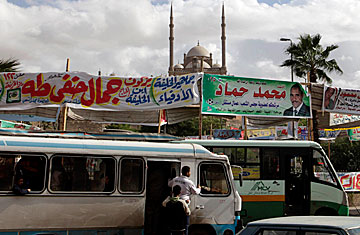
Election banners in Cairo on Nov. 14, 2011, ahead of Egypt's parliamentary elections
On a weekday morning in Cairo's working-class district of Shubra, Mohamed Abdallah, a fruit vendor, is paying little heed to the hand-painted political banners that have recently taken over the space overhead. "All those who are running [in the elections] are thieves," he says dismissively of the upcoming parliamentary race. "This country is never going to be clean." That's why, Abdallah says, he doesn't plan to vote. "The only person I'll ever elect is Gamal Abdel Nasser," he adds, referring to the charismatic President who died 41 years ago. But a woman passing Abdallah's fruit cart hears this. "No!" she cries, stopping in her tracks. "You have to vote! Vote for the sake of our country!"
A police officer jumps in too. "Egypt is the mother of the world. You have to vote," he says, crossing his arms. "You're a police officer — it's none of your business. Stay out of it," interrupts another passerby in a suit. An argument quickly erupts over who's right and who's wrong, and soon, a flock of strangers have gathered around the fruit cart.
If one thing has surely changed since the February overthrow of Egyptian President Hosni Mubarak, it's that Egyptians have ushered in a new atmosphere of political expression and debate. Prospective voters, analysts and politicians predict that an unprecedented number of Egyptians will turn out to vote on Nov. 28 when the country makes its first attempt at democracy since Mubarak's ouster.
And yet, many also say they feel unprepared. "I feel like most people don't know what they're doing," one middle-aged Egyptian man confessed at a campaign event hosted by liberal candidate Amr Hamzawy on Monday night. "I'm an educated man from the educated class, and this is the first time I'm going out to hear about politics," he continued. "I want to vote for someone, and I don't know who to vote for."
Analysts say the uncertainty is due in part to the fact that Egypt's newly modified electoral system is unnecessarily complicated. Candidates will compete for the 498 seats via both closed party lists and individual candidacies depending on the district, in a setup that few seem to grasp. Voting will occur in stages, but the schedules and districts have been so poorly publicized that many prospective voters say they still don't know when and where they get to vote. Marina Ottaway, a Middle East expert at the Carnegie Endowment for International Peace, says the country's military rulers who designed the system are setting themselves up for disaster. "Essentially there are going to be six election days, plus additional days for runoffs in various constituencies," she says.
Egyptians have grown increasingly cynical about the military's intentions in recent months, amid harsh crackdowns on voices of dissent, including one of the uprising's most prominent bloggers. And many now question whether the military will eventually cede power to a civilian authority, as promised. The complicated election layout and an attempt by the ruling council to pass conditions on the parliament's power ahead of elections have only exacerbated tensions. "No matter what they do, there are going to be great suspicions," Ottaway says. If authorities choose to release the results of the first round, it will impact the next, she says. "If they don't release the election results, all the parties that don't do well are going to scream that the elections were manipulated."
The atmosphere of confusion and mistrust has contributed to some level of voter apathy. And it doesn't help that no one has ever done this before, others point out. "Most Egyptians, it's the first time for them to vote," says Mohamed Hassan, a mechanical engineer and member of the Muslim Brotherhood's Freedom and Justice Party. "Many people have no idea about the elections, and in the past there were just two sides: the National Democratic Party [NDP] and the opposition. Now we have many groups."
